Colorado has become the third state in the country to have a confirmed case of vesicular stomatitis (VSV). Follow the Colorado State Department of Agriculture for updates. We will also be updating this page regularly.
If you suspect your horse has VS or shows any sores similar to VS, call your vet and do not transport your horse anywhere.
For any questions and for full information, you can visit the State Vet Website: https://www.colorado.gov/pacific/aganimals/vesicular-stomatitis-virus-vsv
On July 3rd, the National Veterinary Services Laboratory reported positive test results on samples submitted from two horses in Weld County.
VSV **as of 9/24/2019 per the state vet** is active in 22 counties and only 44 facilities. 622 facilities quarantine have been lifted as well.
| Colorado County | Total Current Quarantines | Released Quarantines |
| Adams | 1 | 14 |
| Alamosa | 1 | 3 |
| Arapahoe | 2 | |
| Archuleta | 17 | |
| Boulder | 56 | |
| Broomfield | 2 | |
| Chaffee | 1 | 2 |
| Conejos | 2 | |
| Delta | 2 | 43 |
| Dolores | 1 | |
| Douglas | 4 | 14 |
| Eagle | 1 | |
| El Paso | 1 | |
| Fremont | 1 | 1 |
| Garfield | 4 | 2 |
| Gilpin | 1 | |
| Grand | 1 | |
| Gunnison | 1 | |
| Jefferson | 7 | 57 |
| La Plata | 1 | 65 |
| Larimer | 9 | 134 |
| Las Animas | 1 | |
| Mesa | 2 | 56 |
| Mineral | 1 | |
| Montezuma | 29 | |
| Montrose | 1 | 27 |
| Morgan | 1 | 5 |
| Ouray | 1 | 4 |
| Park | 1 | 1 |
| Pueblo | 5 | |
| Rio Blanco | 1 | |
| San Miguel | 1 | 2 |
| Summit | 1 | 1 |
| Teller | 1 | |
| Weld | 1 | 72 |
| TOTALS: | 44 | 622 |
What Veterinarians Need to Know
Report any cases that have clinical signs suggestive of VSV to the State Veterinarian’s Office at 303-869-9130. Reporting cases as quickly as possible will benefit your client and is the best way to reduce the negative implications to other owners.
NON-EQUINE CASES: All suspected VSV in non-equine cases (cattle, sheep, goats, pigs, camelids) must be investigated by state or federal animal health officials.
EQUINE CASES:
- Hold Order: If you suspect VSV, in addition to reporting the case to the State Veterinarian’s Office, inform the owners that they are under a Hold Order which means that livestock cannot leave the premises until testing is done or the State Veterinarian releases the Hold Order. Once the state vet receives the report, they will mail a hold order to the owner. Call the state vet’s office if you have any questions on the restriction of livestock movement into and out of that facility. The Hold Order will remain in effect until the results of laboratory testing are reported which takes approximately 3-7 days.
- Lab Submission: Now that the index case has been confirmed in Colorado, the Colorado State University Veterinary Diagnostic Laboratory (CSU VDL) in Fort Collins has been activated to receive and test samples for equine species only with VSV compatible clinical signs from accredited veterinarians.
- When you call to report the case to the State Veterinarian’s Office, you will be given an investigation number that must be included on the lab submission form.
- Read the Submission Information Details page on the state vet’s site for more detailed information about submitting samples and the Sample Shipping Information page for specifics on shipping substances.
- Sampling: When sampling a horse for vesicular stomatitis, you must obtain a minimum of two samples:
- Serum (for complement fixation) – at least 2mL, separated from the clot and submitted in a red-top or other sterile tube
- Note: CF test can be negatively impacted if serum is not separated from the clot
- Sterile swab (for PCR) – (Dacron/polyester with a plastic shaft) of lesions placed in a screw-cap or other sterile tube with a maximum of 3mL TBTB media. Make sure tube lid is secured so fluid does not leak out of the tube. Do not use wooden shafted swabs as they contain PCR inhibitors and cannot be accepted.
- Additional samples to the swab may include:
- Vesicular tissue (epithelium) placed in a screw-cap tube with TBTB media
- Vesicular fluid (from unruptured vesicles) placed in a screw-cap tube.
- Serum (for complement fixation) – at least 2mL, separated from the clot and submitted in a red-top or other sterile tube
- Supplies: TBTB media will be made available to accredited veterinarians for sample collection for VSV cases. Please contact one of the following:
- CDA Animal Health Laboratory
300 S Technology Ct, Broomfield, CO 80021
(303)869-9230 - Colorado State University, Veterinary Diagnostic Laboratory
Fort Collins: 2450 Gillette Drive, Fort Collins, CO 80526 Ph. (970)297-1281
Rocky Ford: 27847 Road 21, Rocky Ford, CO 81067
Grand Junction 425 29 Road, Grand Junction, CO 81504 - The State or Federal field veterinarian in your area
- CDA Animal Health Laboratory
- Results: https://drive.google.com/file/d/1TTC2uHPTvMx7hDMhnQZxT48OuX8hbfiL/view
- If the laboratory results are NEGATIVE: The Hold Order will be removed unless VSV is still highly suspected, in which case additional samples may be collected and tested before the Hold Order is removed.
- If the laboratory results are SUSPECT: Suspect results might be reported for the blood tests. The Hold Order will remain in place until further virus isolation test results are completed and reported. Additional blood samples may need to be collected.
- If the laboratory results are POSITIVE: A quarantine, a formal written no movement requirement, will be placed on the movement of horses and other susceptible animals from your premises in order to control the disease. The quarantine will remain in effect for 14 days after the start of VSV lesions in the last affected animal.
Health Certificates
Colorado veterinarians and livestock owners should contact the state of destination when moving livestock interstate to ensure that all import requirements are met. States may impose certain restrictions for horses and livestock coming from VSV affected states. Visit this website for a list of contact information for all state veterinarians’ offices.
If the destination state requires you to certify that the livestock do not originate within a specified distance of a VSV-quarantined premises (for example a 10 mile circle), call the state vet’s office at 303-869-9130. One of our staff can map the location of your client and the location of the nearest quarantine so you can ensure they meet the destination state requirements.
Vesicular Stomatitis Virus Background
Vesicular Stomatitis is a viral disease that primarily affects horses and cattle and occasionally swine, sheep, goats, llamas, and alpacas. The transmission of VSV is not completely understood, but includes insect vectors such as black flies, sand flies, and biting midges as well as through horse to horse by contact with saliva or fluid from ruptured blisters. The incubation period ranges from 2-8 days. Clinical signs include vesicles, erosions, and sloughing of the skin on the muzzle, tongue, teats, and coronary bands. Often excessive salivation is the first sign of disease, along with a reluctance to eat or drink. Lameness and weight loss may follow.
Humans may become infected when handling affected animals, but this is a rare event. To avoid human exposure, individuals should use personal protective measures when handling affected animals.
More information on VSV can be found through these links:
- http://csu-cvmbs.colostate.edu/vth/Pages/vesicular-stomatitis-presentation.aspx
- https://aaep.org/horsehealth/vesicular-stomatitis-horses
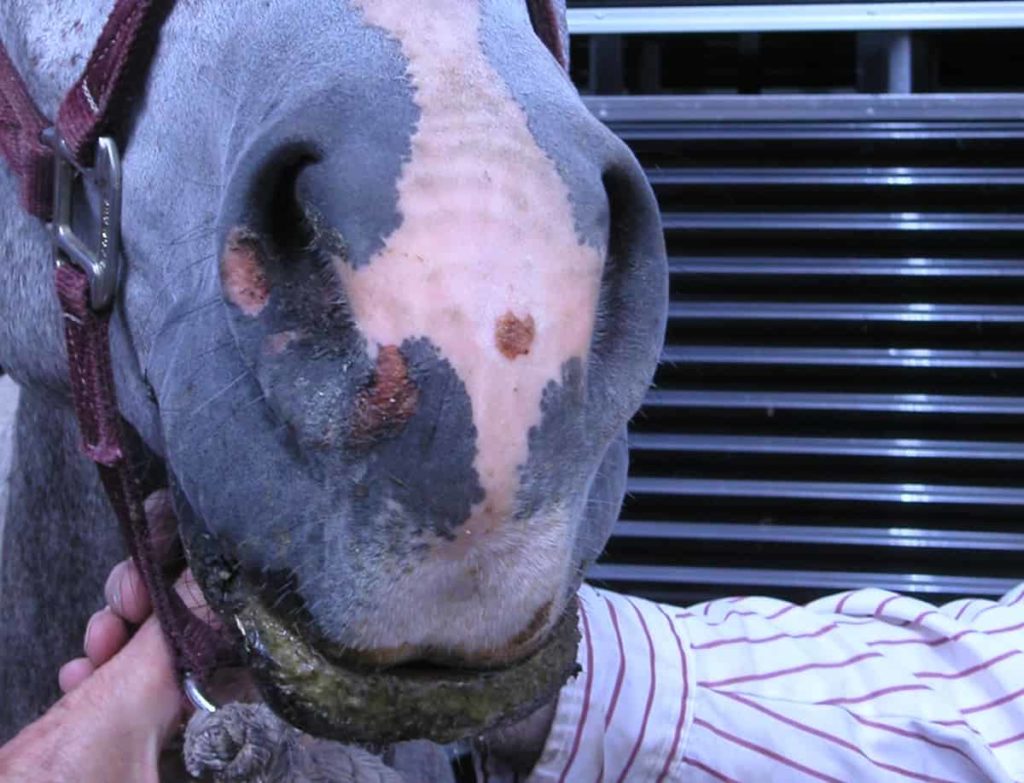
Example of Vesicular Stomatitus Virus (VSV) in horses. 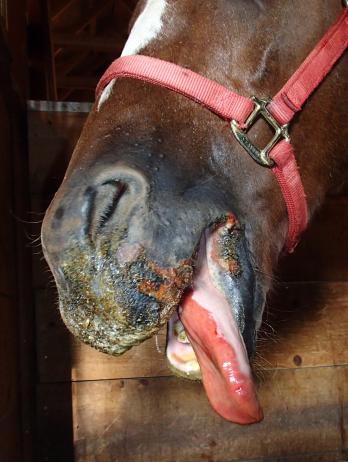
Example of Vesicular Stomatitus Virus (VSV) in horses. 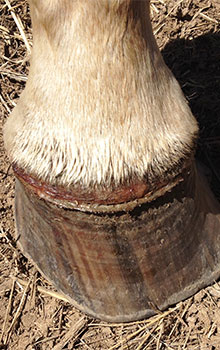
Example of Vesicular Stomatitus Virus (VSV) in horses. 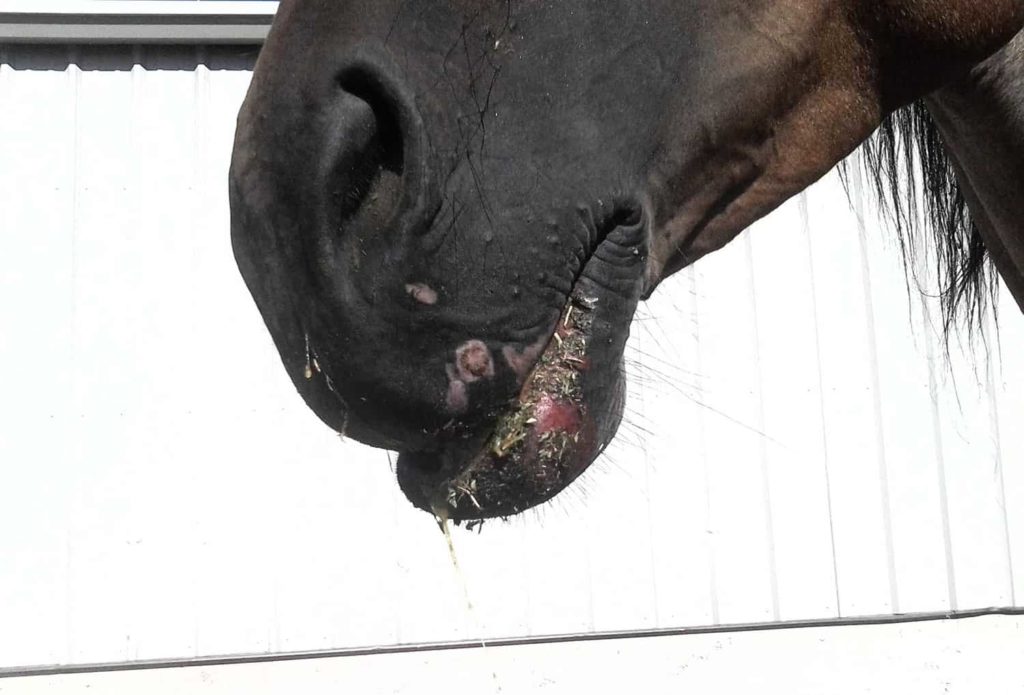
Example of Vesicular Stomatitus Virus (VSV) in horses.
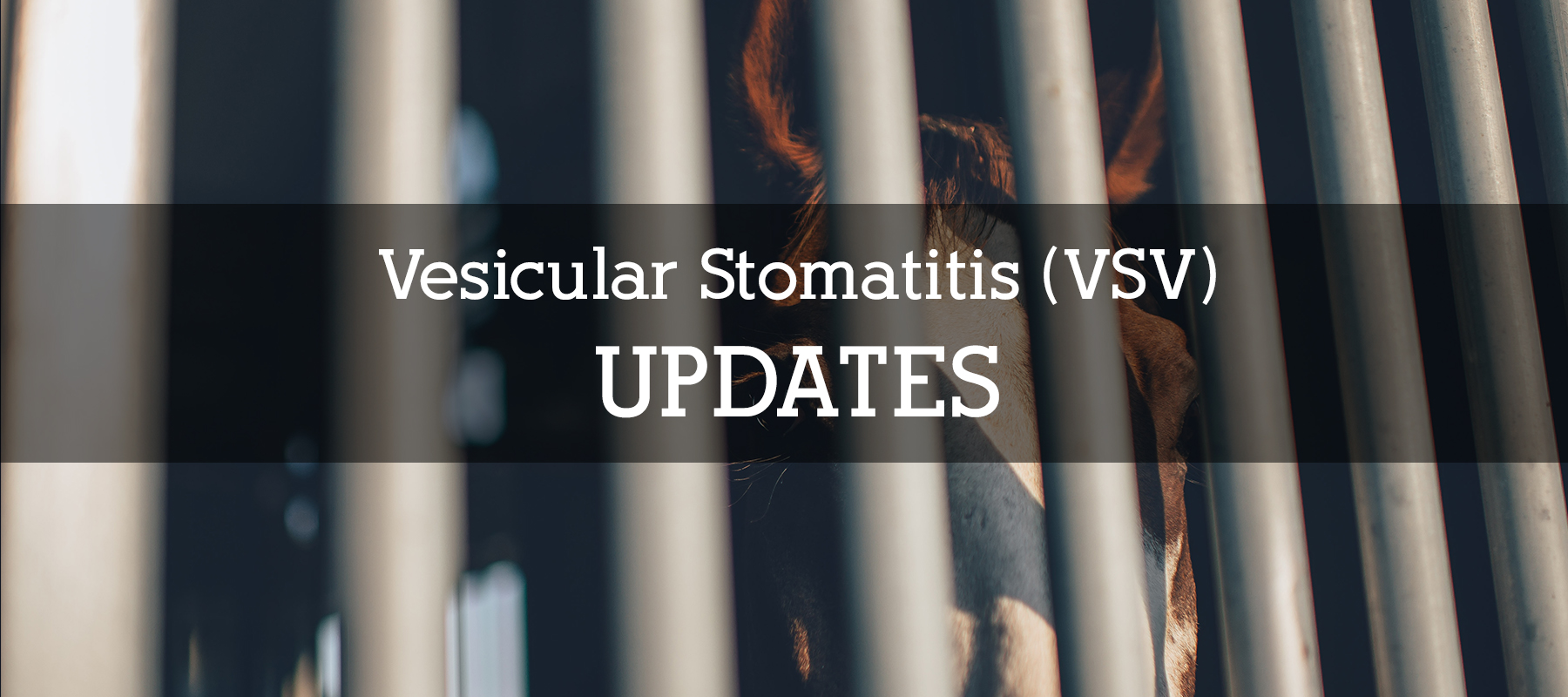

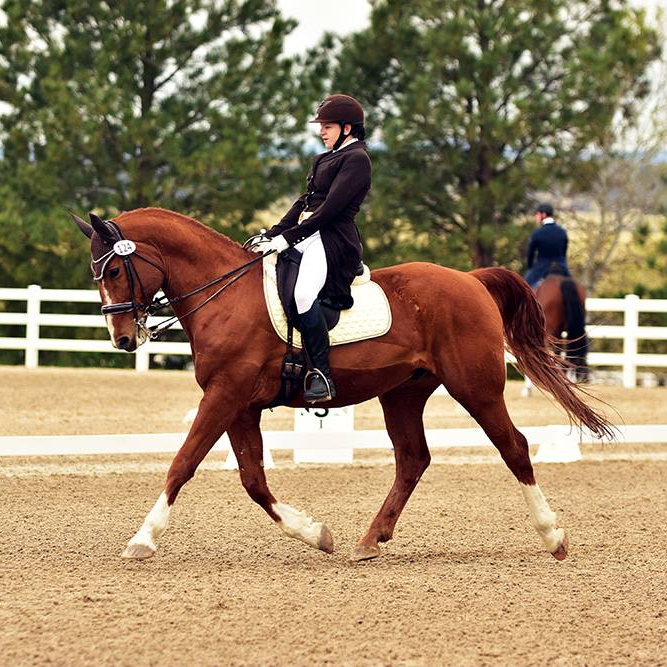



Leave a Reply
You must be logged in to post a comment.